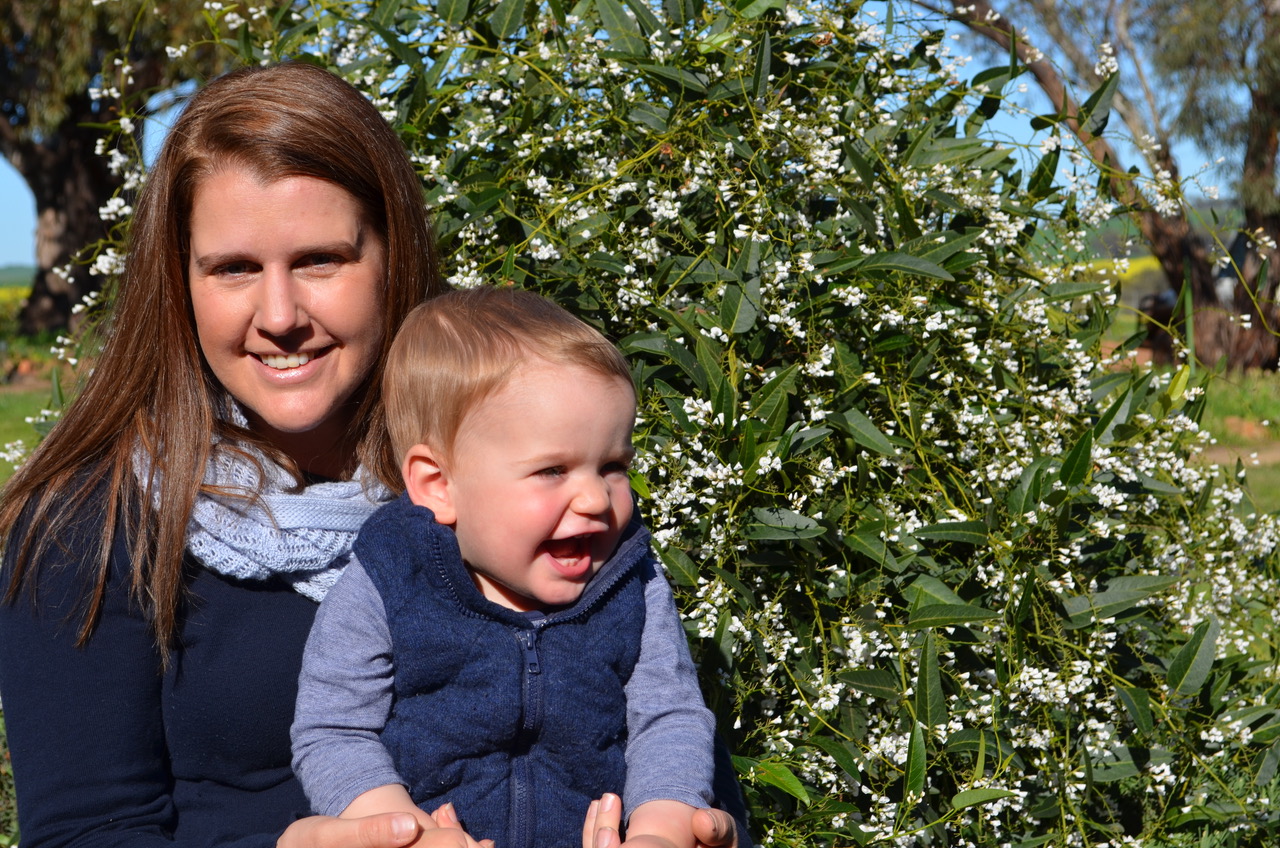Lisa loves her regional lifestyle but the juggle is still real.
Returning full-time to her career in agrifinance soon after parental leave was not in Lisa Judson’s grand plan. But after trialling full-time working hours and with the support of her employer, husband and a strong childcare network, Lisa is nailing the juggle struggle on her own terms.
Lisa loves the autonomy and flexibility that comes with her role, and credits it for helping her achieve the full and rewarding life she leads in regional WA. Did we mention Lisa’s credentials include hobby farmer and business owner? Lisa chats to us about her return to work experience, the bustle of regional life, and being clear on her ‘why?’.
Can you tell us about your career journey so far?
I started out working in financial planning in Perth for a few years. I then changed direction and completed some study in environmental management. This led me to move regionally where I secured work in natural resource management, community development and project management. This was a really empowering time in my work life and gave me the opportunity to diversify my skills, but the cyclical nature of contract work and projects saw me seek stability, and I started working in agrifinance after a chance meeting with a banker.
I initially thought I would work a couple of years and then move on. I’m about to clock up over 11 years with the same organisation. In this time though, I have moved between a few different roles that have offered various opportunities and really cemented a core skill set for me around finance.
Also during this time, I made the decision to live regionally permanently and essentially put down roots, so the opportunity to ‘job hop’ is very limited. I have been in my current role as an agribusiness manager for seven years, and really value and enjoy the relationships I have been able to build with clients.
The role itself is incredibly challenging at times, and it certainly isn’t everyone’s cup of tea, but it provides me with the opportunity to work in agriculture, be out on farms with clients on a regular basis, and essentially manage the role sort of like my own business. Working as an agribusiness manager for this length of time has enabled my husband and I to live where we do and undertake some recreational hobby farming in addition to running our own small business which we find hugely rewarding.
You used some of your keeping in touch days when you were on parental leave. How did you find the experience and did the days help with your return to work?
Initially I disliked the idea of keeping in touch days. I was committed to being 100% present during my parental leave as I knew I would have to go back to work at some point, and felt they were just an unwelcome distraction from my current ‘project’.
As my start date drew nearer though, I saw their value and realised it was going to be beneficial for me to use them. Working those days would enable me to have a more seamless transition back to work, so I relented and used a couple. In hindsight, I probably would have benefited from utilising more days, especially had I taken parental leave for a longer period.
You describe your return to work as being nothing like you anticipated when you negotiated your return with your manager. What did you learn from this?
I initially negotiated to return to work nine months after my son was born. My manager was supportive, flexible and accommodating. We agreed, and built a role around working three days per week on a job share basis.
After a few months, some challenges associated with the job share arrangement arose, and my manager and I talked through how we could make it work to ensure our customers were supported and I could still be the kind of parent I wanted to be.
I started out working full-time on a temporary basis, and soon realised that I might actually be able to continue working full-time by making a few changes to the way I used to work and establishing a good framework for support.
I work very flexibly, my role involves a lot of travel, and I tailor my location and hours to suit both work and home. There is no way I would ever have thought that I would be working full-time after only a few months back at work after parental leave, and I have learned some key things:
- You are more capable than you think you are – Trust yourself and your ability to manage the juggle.
- Flexibility is essential – You need flexibility in your workplace, but also the ability to be flexible and respond to the inevitable, eg, kids getting sick at the most inconvenient times. Having flexible childcare arrangements is key. In addition to traditional day care two days per week, we have a great nanny who comes to our house, and willing and able grandparents who save the day regularly.
- Embrace working differently – Challenge working cultural norms and push the boundaries in terms of flexibility. Your path back from parental leave is yours, but you are also paving the way for those who come after you, as did those who came before you.
- Be very critical of how you commit and spend your time, inside and outside of work – Do not apologise for saying no. Say it often and spread your ‘nos’ around.
I don’t think I could have considered this path without a supportive and forward thinking line manager who truly understands my circumstances. Equally important is my ‘work wife’—the person who has my back at work and helps me stop things slipping through the cracks. Also, I may be the one in the job, but to do the job I need a partner who is equally practical, hands on and emotionally supportive—this gig is hard!
What do you think the biggest barriers are for women returning to work and thriving? What needs to change? What can be done to practically support women?
The biggest barrier for me is an intangible one. Cultural perceptions and expectations of working mothers are still quite archaic in my opinion. Women seem to feel grateful for being offered a flexible/part-time/suitable role instead of expecting it.
To improve this, it would be nice to see flexibility expanded to more than just non-standard hours or location, and part-time roles being embraced as the norm. If you want to work full-time hours, take on multiple part-time roles which feels less like you are being ‘given part-time’ and more like you are fulfilling a business need which also meets a family need. We have the flexible working policies but not the flexible working culture…yet.
Practically, it would be great to see a childcare support model that isn’t swayed towards one framework. One of the things I value most is the myriad of childcare support options available to me to allow me to work full-time. If I relied on just one it would make things extremely difficult. Unless you have willing and free family support, it can be extremely costly.
We also need the performance management framework that businesses work under to be completely overhauled.
Putting people into the same boxes and setting one size fits all targets will always stifle flexible working culture and slow down truly establishing new ways of working.
Did you feel like colleagues treated you differently when you returned to work part-time?
Yes, I did, but not on purpose. People’s perception of someone’s commitment when they are working part-time is established in old school thinking. Now that I am working full-time things have changed, and many are amazed at how I am managing it. As a result, I think I get more support from within the company, although it would be better if when returning to work I wasn’t asked if I was returning part or full-time, just recognised that I am back and contributing.
How has becoming a mother changed you? Are you more or less ambitious career-wise?
Yes, I think becoming a mother has changed me. Surprisingly, I have less patience for people who can’t organise themselves when they only have themselves to organise! I also am very clear as to my ‘why?’. If I am going to travel to work every day and be away from my family, then I need to know why I am doing it.
In terms of career ambition, for me working has never been about a career but about being challenged in the work I do and being able to earn a living to maintain a particular lifestyle, instead of chasing a career and dragging my life with me.
It can often feel like having kids and a career are mutually exclusive. What are your thoughts on this?
I don’t think they are necessarily mutually exclusive because the term ‘kids’ is wide ranging. Children’s needs change over time and you can turn up or down your career based on what your family needs. I think having kids and a traditional career may be mutually exclusive, but opportunities are starting to open up and hopefully very soon working differently, pursuing career growth and having a family will be the norm for all parents.
What is the best career advice you have ever been given?
You have to give to get.
Favourite time of the day is … sunset, at home. It’s generally pretty picturesque, and it’s our little piece of paradise.
Instagram sites that inspire you … @real_mumma Adele Barbaro for practical mum advice; @myfarmwifelife umm, house envy; @ourlovelylifestyleperth Aims and I used to work together and I love seeing what she is up to now.
I’m happiest when … I’m at home with a full weekend ahead of me with no commitments.
I’m addicted to … my devices—just ask my husband, he’d concur! But I love to be organised and they do the trick.
Favourite wardrobe staple for work … my ten year old R.M. Williams boots. Given the line of work I am in they’re pretty much the only shoes I wear, but I am dreading having to ever replace them.
Favourite wardrobe staple for weekend … vest and scarf. I love winter and can’t get enough of this combo.
My role model is … too many to mention, but there is a consistent theme: women living regionally, making a difference and generally nailing it.
Heels or flats? Flats … every day of the week, home or work.
Discover more Real Stories from our Circle In community HERE.








